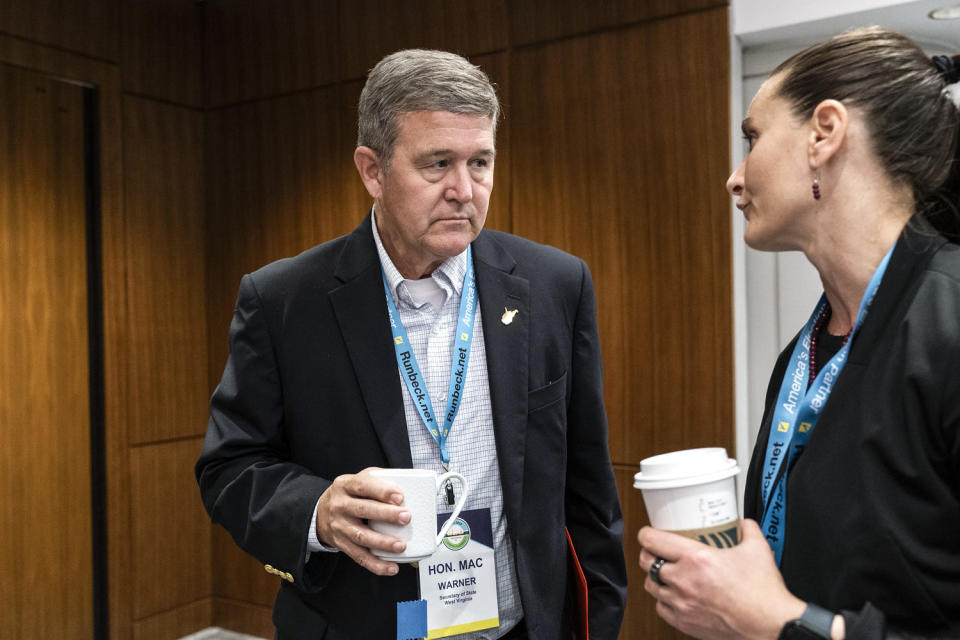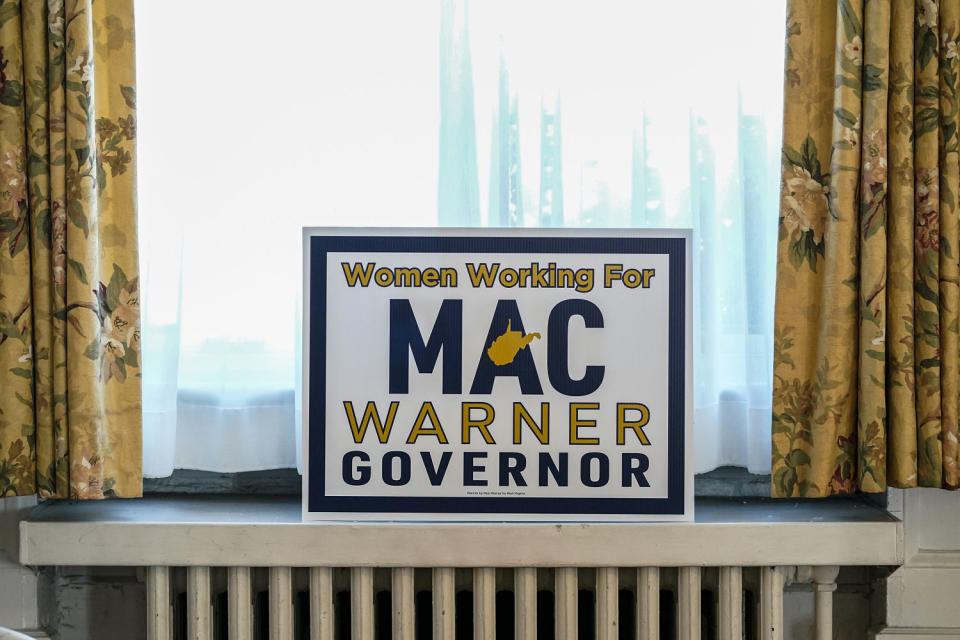West Virginia’s top election official embraces conspiracy theories and election denial
- Oops!Something went wrong.Please try again later.
- Oops!Something went wrong.Please try again later.
WASHINGTON — The National Association of Secretaries of State Winter Conference is usually a cordial affair. It’s one of two occasions every year in which top election officials from most states gather to commiserate and share nonpartisan advice. But at this year’s conference, West Virginia Secretary of State Mac Warner drew rare groans from the crowd.
During the question-and-answer portion of a cybersecurity panel, which included senior officials from the FBI and Homeland Security’s Cybersecurity and Infrastructure Security Agency, Warner stepped up to the mic. “In October of 2020, the CIA lied to the American people on purpose and it was covered up by the FBI,” he said. “We have our own federal agencies lying to the American people.”
The panel thanked Warner tersely and moved on to another question.
Warner, who has been in his role for eight years and is running for the Republican nomination for governor, made similar conspiratorial claims about the CIA on the debate stage in December. His statements fit into a larger false conspiracy theory that he’s advanced that government agencies such as the CIA had a hand in rigging the 2020 election. The remarks have solidified him among his colleagues as the only sitting election director in the country to openly embrace the election denialism that former President Donald Trump has used to explain his 2020 loss.
“It is problematic when you have a chief election officer of a state embracing conspiracy theories that undermine people’s confidence in the election process for no good reason,” said Rick Hasen, a professor of election law at the UCLA School of Law.
“People should be able to look to their election and elected officials to provide them with truthful information and not to fan the flames of conspiracies,” Hasen said.
Warner, more than any other top election official in the country, has vacillated over the years between promoting election conspiracy theories and fighting them.
In interviews, three secretaries of state told NBC News they believe his election rhetoric is a political tactic to garner votes, something he disputes.
In January 2017, after Russian intelligence conducted an election interference campaign against the U.S., the Obama administration moved to reclassify elections as critical infrastructure, meaning the government could provide the same types of security aid to elections as it does to sectors like water and electricity. Secretary-elect Warner railed against the move at the time, saying it was a federal infringement on states’ rights to conduct their own elections.
After the Trump administration kept that decision in place, however, he changed his mind.
“When the Obama administration made it into critical infrastructure, we rejected or went against it, but then the Trump administration validated that so I was like, ‘Well, both sides are doing this. They know something we don’t.’ So we decided to play with them instead of opposing it,” he told NBC News in an interview several hours after the panel.

With Trump in office, he changed his approach and began fighting against election fearmongering. By 2019, Warner was touring West Virginia local high schools with a custom presentation cautioning students to not fall for Russian propaganda that seeks to divide Americans and denigrate their faith in democracy.
“They’re trying to put that division in there so citizens don’t trust citizens, citizens don’t trust the government, citizens don’t trust the democratic process,” he said at the time. That year, Warner joined Pennsylvania’s secretary of state at the time, Democrat Kathy Boockvar, as co-chair on a key NASS council that worked with federal agencies to streamline potential threat information to election officials.
In early 2020, he penned an op-ed with Boockvar that warned voters that misinformation and disinformation “have become major threats to our democratic system,” and stressed the importance of maintaining voters’ trust in the integrity of the voting process.
Warner’s conspiracy theories about U.S. agencies interfering in the 2020 election, which he explained to NBC News the afternoon of his outburst, are false. The claim that the CIA lied is a reference to the fact that some former CIA employees — none of whom were still with the agency — openly cautioned in 2020 that mysteriously surfaced emails from Joe Biden’s son, Hunter, on a laptop he allegedly brought in for repairs and forgot about, could be part of a Russian interference effort. The agency did not make any such public statement. A spokesperson told NBC News that “the claim that CIA interfered in the 2020 election is absolutely false.”
In claiming that the FBI interfered, Warner alleges that the agency overtly pressured Facebook and Twitter to censor news about those emails. While the FBI did caution tech companies that Russia could potentially leverage them in an information operation, and Facebook and Twitter did temporarily halt the spread of a New York Post story on the emails, no public evidence exists to suggest that the agency specifically pointed to the emails as a form of Russian interference or forced the tech companies to take any action. The FBI did not respond to a request for comment.
As an elected official, Warner has had to contend with the rapidly shifting politics of West Virginia. In recent decades, the state has gone from one of the most historically Democratic to almost fully Republican. The GOP holds all major state offices and has a supermajority in both chambers of the state Legislature. With Sen. Joe Manchin retiring this year, the state appears poised to send no Democrats to Congress for the first time in more than a century.
That heavy partisan shift has given Warner a difficult balancing act. He has declined to formally endorse any politician while working as West Virginia’s chief election officer, including his wife, a current member of the state Legislature, or Donald Trump. (His campaign website does include a prominent picture of him with Trump.) One of Warner’s main primary opponents, the state’s New Jersey-raised Attorney General Patrick Morrissey, has campaigned on being Trump’s true champion in the race.
Despite a lack of evidence of widespread voter fraud, a majority of Republicans believe Joe Biden’s 2020 election was illegitimate. Several of Warner’s colleagues said they believed his conspiracy theories were an attempt to win over West Virginia Republicans for his primary race.
“Our association is not immune to political grandstanding. He’s running for governor,” said Adrian Fontes, the Democratic secretary of state of Arizona.
“It’s really sad, I think, that he thinks he has to draw attention to himself that way. I don’t even know that he really believes that, to be honest with you. He might just be pandering to a rabid base but it doesn’t help the rest of us,” Fontes said. “We have an inherent civil faith in one another in this society. And the election denialism movement is trying to destroy that.”
“It’s no accident that Mac’s running for governor right now in West Virginia,” said Michael Adams, the Republican secretary of state of Kentucky, who has battled with conservative conspiracy theorists in his own state.

“My style is just different from Mac’s, and so when I run for higher office in the future, I’m not going to do that kind of stuff Mac does. But you know, to each his own,” Adams said.
Jocelyn Benson, the Democratic secretary of state of Michigan, said she was personally disappointed in Warner.
“People can choose to further political agendas to gain popularity in their state, that’s their right. But what we lose is a colleague who was a good partner and someone who helped us all be better at our respective jobs. And that’s why it’s so hard,” she said.
Warner said in an interview that “it would be very politically expedient for me to endorse Trump and get behind him and so forth, especially in a very red state like West Virginia.”
“But I put principle over politics. I’m just simply not gonna go down that road [and] if it costs me political points, so be it. And I think that would be a good response to somebody saying I’m trying to play politics by calling out the CIA,” he said.
Warner, who came to politics after a long Army career, has bucked election consensus before. West Virginia was the only state to allow any willing county to experiment with an app that allowed veterans and other Americans overseas to vote with their phones, which cybersecurity experts warned could not be fully secured. The state stopped using the app in 2020.
Warner told NBC News that he was “absolutely” confident in his conspiracy theory claims, despite the consensus against them.
Warner explained that he hasn’t found much use for federal government agencies he interfaces with.
“I haven’t found that much actionable material coming out of our three-letter agencies,” he said.
“For the most part, those security clearances haven’t done us any good. We’re reading stories people like you write. And then six months later, we’re getting a secret briefing and they’re saying you can’t talk about this and it’s the same thing I’ve already read in the newspaper or seen on TV,” he said.
This article was originally published on NBCNews.com

